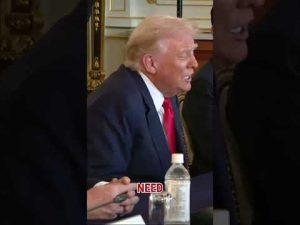**America’s Debt Crisis and the Growing Tensions in Venezuela: A Looming Storm**
As America’s debt climbs to astonishing heights—now surpassing $37 trillion—the country is faced with a growing uncertainty that could threaten families’ financial futures. Citizens across the nation feel the weight of this economic burden, and many are turning to tangible assets like gold and silver for security. Amid this financial chaos, some politicians have turned their attention south to Venezuela, where tensions are escalating. The question looms: Is a military conflict on the horizon?
President Trump has long advocated for fair trade and strong borders, focusing on the issues that resonate most with the American people. However, the narrative is shifting as reports emerge of the U.S. military launching attacks against suspected drug smuggling vessels, leading to questions about America’s involvement in Venezuela. As airstrikes target these boats—allegedly linked to the regime of Nicolás Maduro—concerns arise about the potential consequences of such military actions. Are we edging toward another foreign conflict, and could this one have dire repercussions for the American populace?
Trump’s administration claims the Venezuelan government is illegitimate and has routinely criticized its ties to hostile countries like China, Iran, and Russia. Yet, while securing the borders and curbing illegal immigration remain critical issues at home, the prospect of military intervention could further complicate already strained resources. After all, the nation has only recently begun to address its own systemic problems, from economic disruptions to rising crime rates. Engaging in a military venture could not only draw resources away from essential domestic needs but also lead to unforeseen consequences, including an influx of Venezuelans seeking refuge in America.
Interestingly, Senator Lindsey Graham’s bold comments about regime change in Venezuela add another layer to this debate. While advocating for the removal of Maduro, skeptics question the wisdom of yet another American military venture, recalling the disastrous outcomes of previous interventions in places like Iraq and Libya. Indeed, past experiences suggest that while the initial stages of military action may appear justified, the long-term ramifications often leave countries in chaos. This begs the question: Is America prepared to deal with the fallout from such a conflict, or would it risk further entanglement rather than resolving the issue?
As discussions continue about potential military responses to drug trafficking and regime threats, the larger issue at play is whether America should shift its focus inward. With pressing concerns needing immediate attention, involving the U.S. in foreign military engagements seems like a high-stakes gamble that many are wary of.
Ultimately, while the stakes rise, the voice of caution echoes louder than ever. Trump and his advocates may argue for a hardline stance against drug traffickers in international waters, but the overall sentiment remains: America must prioritize its own citizens first. As the complexities of global politics swirl around us, the necessity for a clear path forward remains paramount. It’s a precarious balancing act, and navigating it requires no small amount of wisdom and restraint. For the moment, the focus must remain grounded at home—because while the world spins, American families are looking to secure their futures amid a financial storm.







